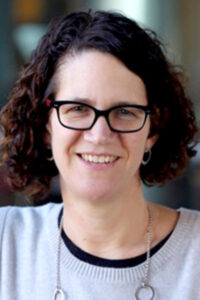Speakers at new plenary to focus on the role of chromosomal instability in cancer
//
Estimated Read Time:
The American Association for Cancer Research Annual Meeting 2021 has added a new plenary session dedicated to the memory of renowned cell biologist Angelika Amon, PhD.
Discovery Science Plenary: Mechanisms, Impact, and Exploitation of Cancer Chromosomal Instability – Dedicated to the Memory of Angelika Amon will explore research areas that Amon helped pioneer and advance during her career. The session takes place from 9:30 to 11:30 a.m. EDT on Saturday, April 10, and will start with Annual Meeting Program Committee Chair Charles Swanton, MBPhD, FAACR, delivering an appreciation of Amon, who died in October 2020 and was supposed to one of the speakers at this plenary, followed by four presentations.

Traditionally, genomic alterations have thought to come from gradual “Darwinian” evolution, but David Pellman, MD, Dana-Farber Cancer Institute, will talk about recent progress in understanding the origin of complex cancer genomes, suggesting that it can also originate from catastrophic mutational events.
“In addition to gradual evolution, it appears that cancer genomes go through big bang-like bursts of genetic alterations,” Pellman said. “Because cancer genomes can be extremely complicated with hundreds or thousands of chromosomal rearrangements, it is parsimonious to consider that this complexity could occur rapidly, through a small number of mutation bursts.”
Pellman’s presentation, “Mechanisms driving the rapid evolution of the cancer genomes,” will summarize work from his lab and others over the past 15 years that offer a deeper understanding about the mechanisms underlying these burst-like mutational processes.
Recent studies show that a significant amount of cancer genome alterations originate from abnormalities in the structure and integrity of the nucleus, what pathologists call “nuclear atypia” Pellman said. His presentation will address the causes and consequences of three of these mutational processes: whole-genome duplication, chromothripsis, and chromosome breakage-fusion-bridge cycles. He will also discuss potential therapeutic implications of this work.

Samuel F. Bakhoum, MD, PhD, who will present “Chromosomal instability and tumor evolution,” noted that chromosomal instability has been known as a hallmark of cancer for more than a century. The advance of next-gen sequencing has shifted the collective attention to mutations in individual oncogenes and tumor suppressor genes as cancer drivers, with much less emphasis about chromosomal instability despite its well-known association with advanced and metastatic cancers.
Chromosomal instability must be reckoned with, said Bakhoum, assistant member, Memorial Sloan Kettering Cancer Center. Most patients die from metastasis, and yet the quest to identify individual genes that drive metastasis has not been fruitful. In a paper published three years ago in Nature, Bakhoum and colleagues showed that chromosomal instability is a driver of cancer progression and metastasis.
“Over the past decade, our understanding of the mechanisms and consequences of chromosomal instability in cancer as well as our ability to develop experimental models that enable us to dissect chromosomal instability has opened up a whole new area in oncology. We now think of chromosomal instability as a targetable alteration rather than a black box,” Bakhoum said. “And that was not the case 10 years ago. That is why we are so excited about it now, because we know that normal cells don’t have chromosomal instability. So now we can target it as a vulnerability and a mechanism to awaken the immune system to view chromosomal instability as a foreign phenomenon rather than self, so to speak.”

Stephen P. Jackson, PhD, Wellcome Trust/Cancer Research, UK Gurdon Institute, will explain why developing a better understanding about how cancer arises requires understanding DNA repair and cellular DNA damage responses during his talk, titled “Exploiting genome instability for new cancer therapies: PARP inhibitors and beyond.” Jackson will review past research that led to the development of PARP inhibitors, which exploit DNA repair weaknesses in some cancers.
Jackson will discuss how genetic screening technologies can identify more therapies targeting DNA repair pathways, the mechanisms thorough which cancers evolve resistance to these therapies, and how resistance to one drug can lead to therapeutic opportunity with a different drug. Viewers will also learn how defects in genomic stability associate with cancer.
“Building on recent successful developments in the arena, we can be optimistic about the generation and utility of new DNA-repair targeted anticancer therapies,” Jackson said. “This, combined with other developments in cancer research and clinical applications may increasingly mean that cancers become much more manageable diseases.”

Karlene A. Cimprich, PhD, professor, Stanford University, will explain “The causes and consequences of replication stress,” addressing how cells respond to and tolerate replication stress and some of its origins. Replication stress is common in cancer and a cause of genome instability.
“There is an important response to that stress mediated by the kinase ATR,” Cimprich said. “Because many cancer cells have high levels of replication stress, they may critically depend on this stress response pathway, and that has led to an interest in targeting it.”
Transcription acts as a source of genome instability through the formation of R-loops, Cimprich said, and she noted that both transcription and R-loops are a source of replication stress. Cancer cells grow with this stress and deregulate certain pathways to help with their growth.


